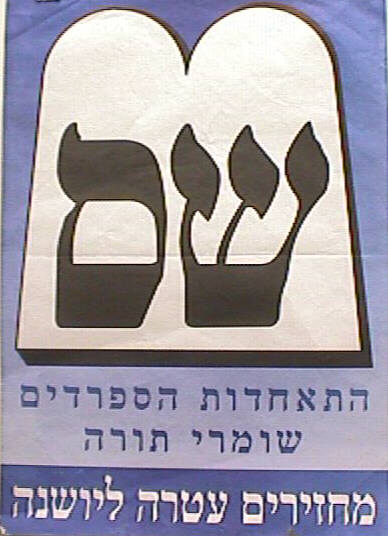
The Sephardic tradition has a different approach to religious observance, rituals and organization than the Ashkenazi, or European version. The word's literal meaning Spanish, and was associated with jews with origins in Spain and Portugal until the expulsion, but it now includes those from North Africa and Iraq. Sephardic groups have spread around the world -- the Philadelphia congregation to which Benjamin Franklin subscribed in 1788 was Sephardic.
In Israel, the Sephardim have received the lesser portion of wealth and power. The Shas party came to speak for the discontent of many of them, religious and non-religious, and became pivotal in Israeli politics. Before the May 1999 election Shas held 10 seats in the Knesset and was part of Netanyahu's coalition; it rose to 17 and joined Barak's government. In the election the party was supporting Netanyahu for prime minister, but far less emphatically than its European ultraorthodox party, United Torah Judiasm.
![]()
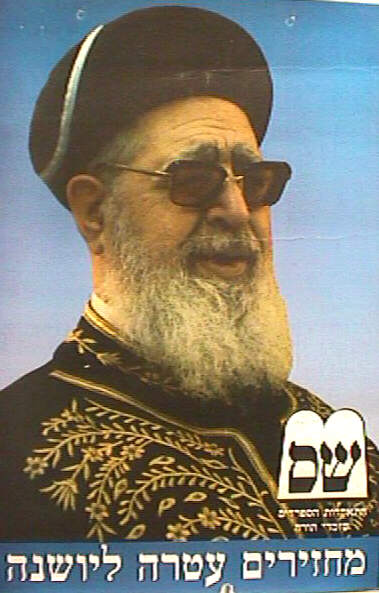
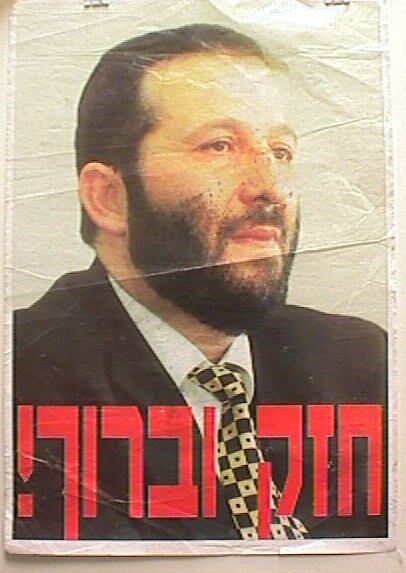
At the age of 29 Deri became a cabinet minister, and he was later pivotal in supporting Netanyahu's peace arrangements. However, he was indicted on charges of bribery and mismanagement of government funds. Netanyahu then got tangled in his troubles, accused of agreeing to appoint an attorney general who would go light on Deri in exchange for Shas support.
![]()
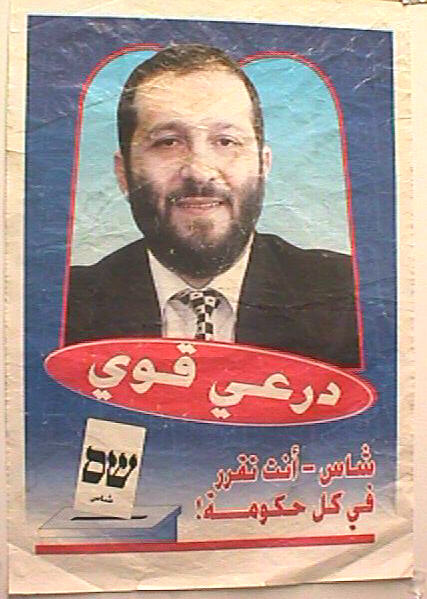
Although Shas defines itself as orthodoxly religious, it drew votes from the wider Sephardic community, largely because it increaed education, housing and health services. Here it is even pitching itself to the Israeli Arab voters. This poster was saved from a ditch in Abu Ghosh, across from the famous Elvis Inn, home of hamburgers served thick and juicy, the way the King liked them. It shows that Shas saw potential voters in the Arabic community. "The shield ['deri' in Arabic] is strong." It is typical for the party holding the ministry of the interior to appeal to voters in the Israeli Arabic community, with its interest in housing and social services. The picture is explicit about how the Hebrew lettered slip for Shas is to be put in the ballot box.
![]()
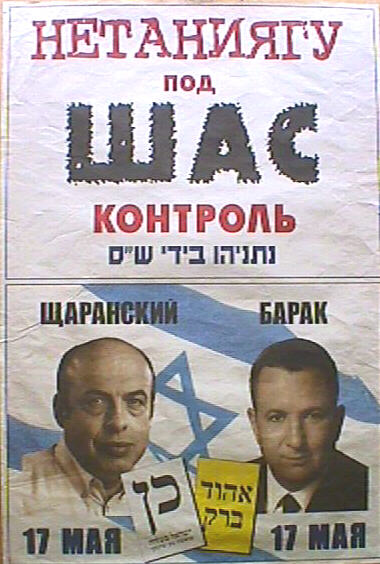
Special enmity arose between Shas and the Russian immigrant community. Shas supporters felt that these new arrivals had jumped over them to rise in Israeli society. Eli Suissa, the Shas minister of the interior in Netanyahu's government, made hasty comments that many Russian emigrants were "pork-eaters" and that Russian women were engaging in prostitution.
From the Russians' viewpoint, Suissa's cabinet post gave him influence over who was truly a Jew among those wanting to immigrate. Israel Ba'aliya, Sharansky's party, adopted the slogan, "Shas kontrol? Nyet! Nash ('our') Kontrol!", which became a catchphrase across Israel, proclaimed in a fake Russian accent. This poster warns that Netanyahu means Shas control. After the election Barak appointed Sharansky as the minister of the interior. His party split almost immediately, because of Sharanksy's hawkish views.
![]()
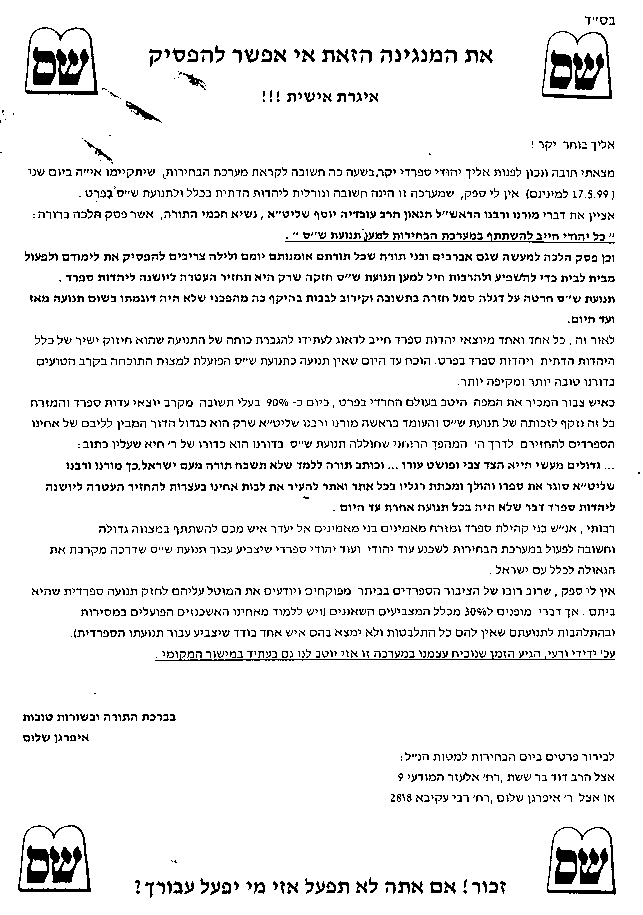
A wide feeling among secular Israelis was that Shas had used its pivotal position to extract money for its separate school system. Its students went to smaller classes, and had longer school days and far better support than those in the secular system. Their subjects were not world history, computer science- these were passed over in favor of religious studies. In the eyes of the critics, the students would end up entering yeshivas, avoiding military service, and drawing on the government treasury.
The secular view also felt that Shas was disdainful of democratic principles, that its supporters and Knesset members were controlled by its rabbis. In this handbill, Rabbi Yosef declares that his interpretation of the law is that Sephardic jews have a religious duty to vote Shas. He himself has left his study of the Torah to go door-to-door.
![]()
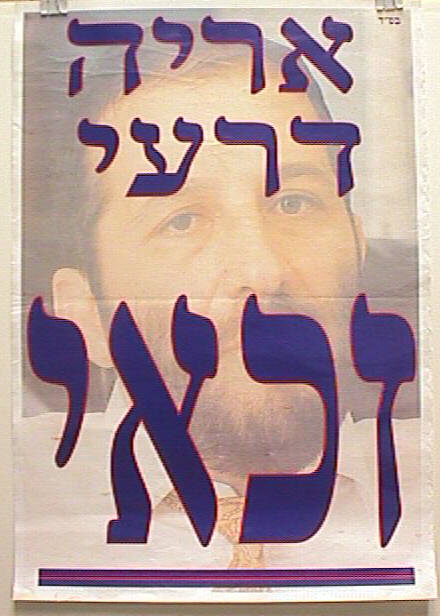
By 1999 Deri's case of bribery and misuse of government funds had gone through ten years of indictments, appeals and motions. By coincidental timing, the Supreme Court announced the final decision in the middle of the 1999 campaign: Deri's conviction was affirmed. This was the biggest news of the election. Israelis watched the TV announcement as Americans had for the O.J. Simpson verdict. A month later, on April 15, the Court gave him an unexpectedly harsh sentence - four years in prison.
Deri's guilt and punishment became a central issue, with overtones of whether Shas considered itself subject to the civil courts. This poster appeared around Jerusalem -- "Aryeh Deri -- innocent!" It was the first poster I collected -- very attractively done, although from a symbolic viewpoint writing words across the candidate's face was perhaps a mistake.
![]()
It was broadcast live on the Shas pirate radio and widely circulated on videotape. On the tape, the woman's demon speaks through her in a man's voice. After inquiring about the health of Rabbi Yosef, the exorcist asks the demon, "Is Aryeh Deri a thief?", but it gives the wrong answer: "Yes!" The rabbi accuses the demon of lying, and it admits that. It is banished from the woman's body through her toe.
The question-and-wrong-answer was deleted from most copies of the tape, but not all, and the whole episode ran on Israeli TV.
![]()
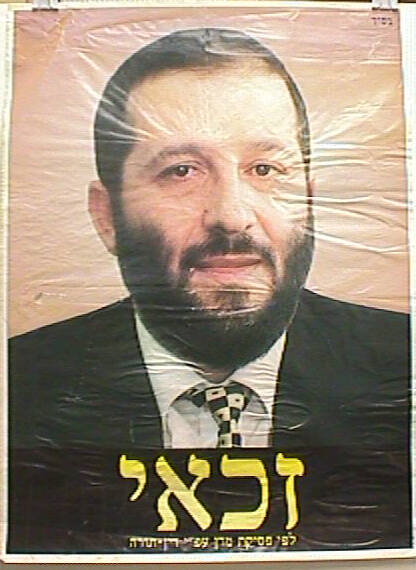
Israelis in general and many potential supporters of Shas took the label of "criminal" very seriously, as American voters would react more to "character," less of an offense against all of society. Shas supporters were distressed over the verdict. The evidence against Deri was solid, and some believed that the charges were just the tip of an iceberg. The poster above proclaiming his innocence was quickly superceded by the one on the left, with a qualifier "INNOCENT, according to the verdict of our rabbi, following the law of the torah." A religious court would need two witnesses against him, but the civil judges had relied on only one.
The word for innocent, "zakai," has another meaning, "permitted." Anonymous wags put up a version of this poster with the small print altered: "PERMITTED - one phone call to his lawyer." Unfortunately it escaped my net.
![]()
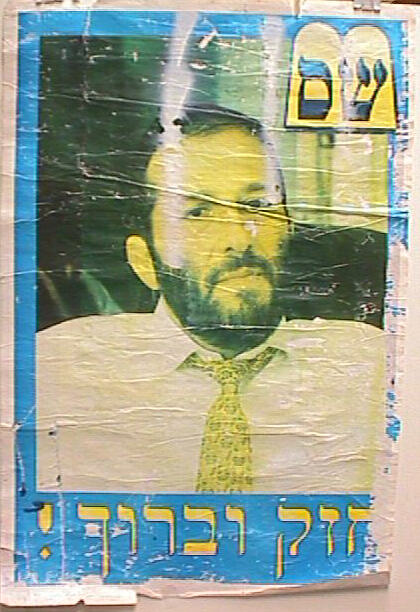
His opponents harped on the criminality issue - here a graffitist has spraypainted prison bars over him. Many of his posters were defaced this way, but this was the best example I could unpeal - it emerged from under a stack of posters plastered on top of each other, and most of the white spraypaint has come loose.
![]()
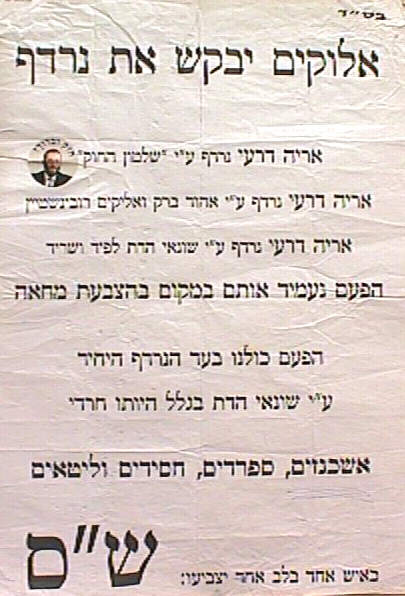
Deri produced a long videotape entitled "J'accuse," comparing himself to Alfed Dreyfuss. Here his supporters appeal to the ashkenazi ultraorthodox. God harbours the persecuted. Barak and other secular politicians are persecuting Deri for his religion, but we will pay them back with our votes -- signed, the Sephardim, the Ashkenazim, the Hassidim and the "Lithuanians" (the latter meaning the two divisions of the Ashkenazi ultraorthodox.) The poster does not say he's innocent. Many of the Ashkenazi ultraorthodox were suspicious of the Supreme Court, and felt that even if Deri were guilty of the specifics, he had been unfairly singled out.
![]()
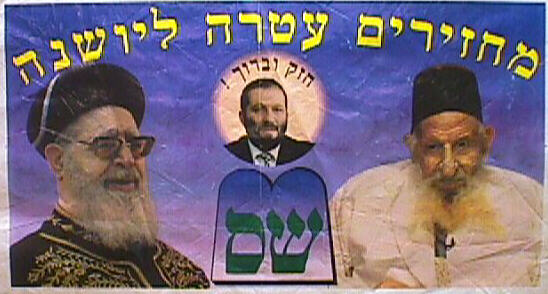
![]()
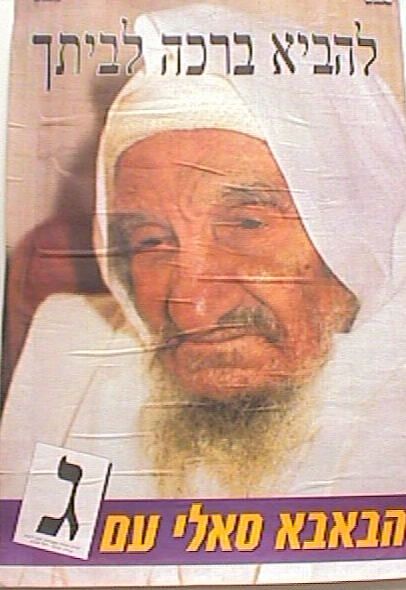
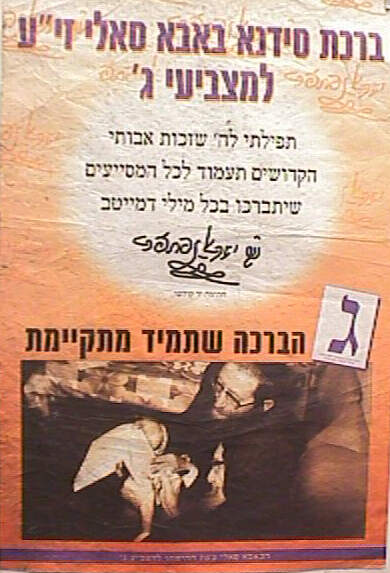
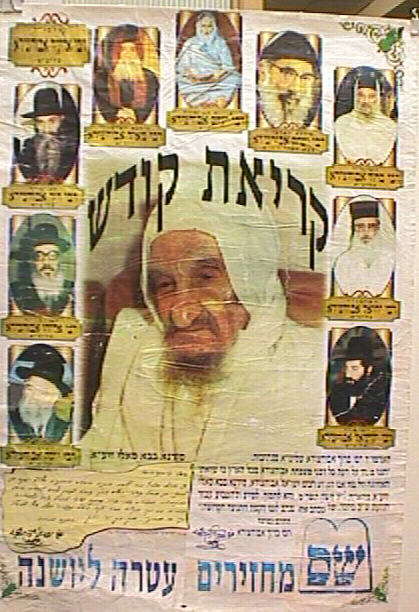
The Baba Sali had died fifteen years previously, and his endorsement of UTJ was given well before Shas gained prominence. Shas replied with an elaborate poster in which his son (top picture on the right) states that, on the contrary, before the end his father had endorsed Shas. The poster included the Baba's ancestors and relatives (the figure at the middle top was his father.) Shas posters were no longer showing Deri. The pictoral message was that the party is the guardian of the tradition.
![]()
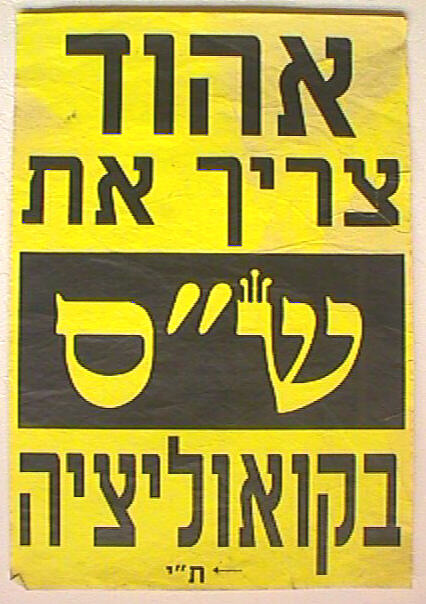
On election day the Deri episode was good for Shas, which received 17 seats, far above expectations. The common explanation saw this as a reaction against the perceived persecution of Deri, and held that the extra seats came mostly from Likud.
Barak declared that he would not include Shas in a coalition if Deri was its leader. This poster appeared in Jerusalem and on the highway to Tel Aviv just after the election. "Ehud [Barak] needs Shas in the coalition." The producers are unknown but were likely Shas supporters given the biblical decoration of the letter.
![]()